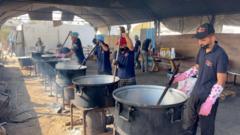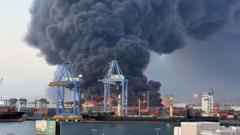After two months of intense Israeli blockade, community kitchens in Gaza are now facing critical shortages of food supplies, leaving many struggling to survive.
Gaza Community Kitchens Struggling as Israeli Blockade Drains Food Supplies

Gaza Community Kitchens Struggling as Israeli Blockade Drains Food Supplies
Gaza's community kitchens warn that their essential food resources are near depletion amid an ongoing Israeli blockade, putting thousands at risk.
In Khan Younis, the US-based humanitarian organization Anera manages community kitchens that provide meals to around 6,000 individuals daily. However, the prolonged Israeli blockade, enacted to push Hamas into releasing hostages, has resulted in the depletion of food stocks, leading to warnings of impending starvation.
On the menu today is koshari—a mixture of lentils, rice, and tomato sauce—whose distribution is facilitated through donkey and cart due to the lack of reliable transport and fuel. Sami Matar, who runs Anera’s operations, expressed the desperate situation for locals, stating, “People rely on our meals; they have no source of income to buy what's left in local markets.”
Israel’s closure of all crossings into Gaza has halted the entry of essential goods, including food, fuel, and medicine, prompting international outrage and escalating fears of humanitarian catastrophe. The UN's humanitarian chief recently highlighted, “Aid, and the civilian lives it saves, should never be a bargaining chip,” stressing that denying aid amounts to punishing civilians.
Currently, the kitchens operating in Gaza are a lifeline for hundreds of thousands. Yet, if the Israeli blockade continues, Matar warns that they may run out of food entirely within weeks. “We used to receive more than 100 trucks every week. Now we don’t have anything,” Matar lamented while gesturing to their nearly empty warehouse.
Life for displaced families remains dire. Many lack basic cooking resources, and even the simple act of preparing tea can require scavenging for firewood. An elderly man received koshari parcels with gratitude and starkly remarked, “We’re only alive because death hasn’t taken us yet.”
As the situation worsens in Gaza, the UN emphasizes Israel's international legal obligations to facilitate humanitarian aid. Concurrently, international pressure mounts on the Israeli government, with calls from global leaders urging a lifting of the blockade for the sake of civilian survival and dignity.
With food supplies dwindling and malnutrition warnings issued, aid workers in Gaza echo Matar’s plea, urging the international community to advocate for the reopening of crossing points. “Please, we just need to open the crossings again,” he urged, as the community kitchens strive to sustain those most affected by the blockade.
On the menu today is koshari—a mixture of lentils, rice, and tomato sauce—whose distribution is facilitated through donkey and cart due to the lack of reliable transport and fuel. Sami Matar, who runs Anera’s operations, expressed the desperate situation for locals, stating, “People rely on our meals; they have no source of income to buy what's left in local markets.”
Israel’s closure of all crossings into Gaza has halted the entry of essential goods, including food, fuel, and medicine, prompting international outrage and escalating fears of humanitarian catastrophe. The UN's humanitarian chief recently highlighted, “Aid, and the civilian lives it saves, should never be a bargaining chip,” stressing that denying aid amounts to punishing civilians.
Currently, the kitchens operating in Gaza are a lifeline for hundreds of thousands. Yet, if the Israeli blockade continues, Matar warns that they may run out of food entirely within weeks. “We used to receive more than 100 trucks every week. Now we don’t have anything,” Matar lamented while gesturing to their nearly empty warehouse.
Life for displaced families remains dire. Many lack basic cooking resources, and even the simple act of preparing tea can require scavenging for firewood. An elderly man received koshari parcels with gratitude and starkly remarked, “We’re only alive because death hasn’t taken us yet.”
As the situation worsens in Gaza, the UN emphasizes Israel's international legal obligations to facilitate humanitarian aid. Concurrently, international pressure mounts on the Israeli government, with calls from global leaders urging a lifting of the blockade for the sake of civilian survival and dignity.
With food supplies dwindling and malnutrition warnings issued, aid workers in Gaza echo Matar’s plea, urging the international community to advocate for the reopening of crossing points. “Please, we just need to open the crossings again,” he urged, as the community kitchens strive to sustain those most affected by the blockade.


















